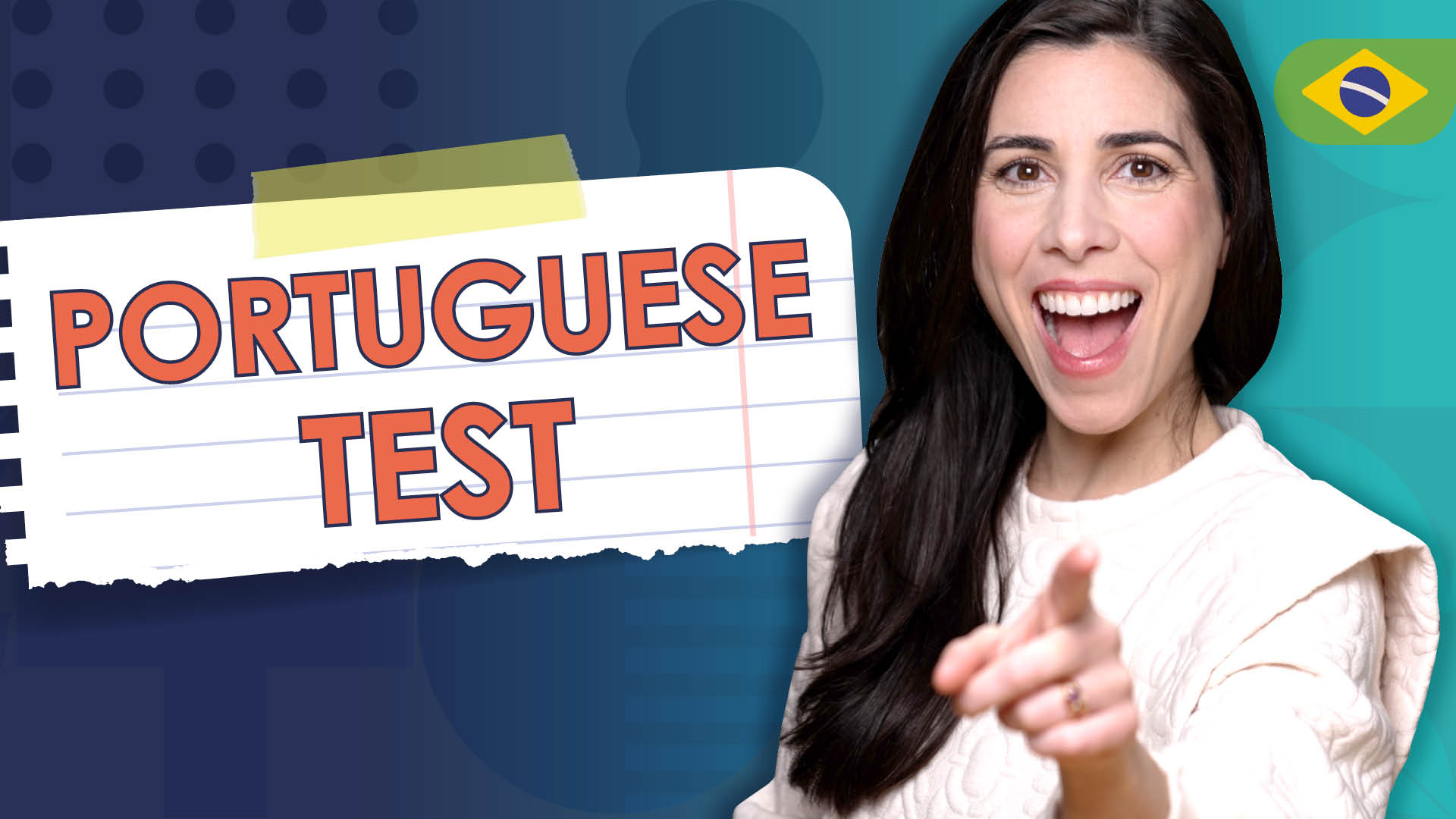Olá, queridos alunos.
Do you know what your level in Portuguese is? How can you evaluate your level? Let’s talk about that.
I prepared a free test for you to evaluate your level in Portuguese. You can access the test here.
Standard Division of Levels
In Europe, they use a system called CERF – Common European Framework of Reference. This system describes the linguistic ability on a scale of six points represented by the letters A1 and A2 (beginner level), B1 and B2 (intermediate level), and C1 and C2 (advanced level).
In Brazil and in the United States, normally we use the terms beginner, intermediate, and advanced to talk about levels. Generally, each school has their own evaluation criteria.
- Beginner or Novice Level (A1)
Upon reaching this level, you will be able to use the most basic and most common sentences and expressions. You will know how to introduce yourself, talk about where you’re from and what you do. You will be able to ask simple questions and interact with native speakers in a slow way, but you will need to stop to think before speaking. You will still have difficulty in understanding native speakers talking naturally, but you will already be able to understand a little if they speak slowly. At this level, you will know how to use the most common verbs in the present tense, but you still won’t have mastered other verb tenses.
- High Beginner or Pre-Intermediate Level (A2)
Upon reaching this level, you will be able to use the language in the most common situations, like for example, on trips and at hotels and restaurants. You will be able to ask for information on the street, talk about your work and about your hobbies, describe things and people, and express your opinion on simple things. At this level, you will know how to talk about the past, present, and future, but will still need to stop to think before speaking. You will be able to communicate with native speakers about simple subjects as long as they speak slowly.
- Intermediate Level (B1)
Upon reaching this level, you will be able to handle most everyday situations more easily. Generally, after months (or years) of exposure to the language, at a certain moment, your brain will click, and you will notice that you can understand what people say better and feel more comfortable expressing yourself in Portuguese. At this level, you will know how to use some more complex verb tenses, such as subjunctive mode and some compound tenses.
You still will not be able to understand everything native speakers say easily, but you will understand a lot, and will be able to watch movies with subtitles in Portuguese, listen to podcasts in Portuguese, read Brazilian books, and all of that will help you reach the next level.
- High-Intermediate Level (B2)
If you’re learning Portuguese for pleasure, or to communicate with friends or family, this is the highest level that you need to achieve. When you reach this level, you will gain confidence in and control of the language. You will be able to communicate with a native speaker without much effort, and people will be able to understand what you’re saying well. You will be able to react naturally to questions and correct your own mistakes. At this level, you will be able to go out to eat with Brazilians and spend hours talking. That’s not to say that you won’t make mistakes, but you will be able to communicate well despite the mistakes. Even though you will still have a lot to learn, you can already consider yourself fluent in Portuguese, since you will be able to speak fluidly.
- Advanced Level (C1)
Upon reaching this level, you will be able to read technical texts and long articles. You will understand conversations about complex subjects without difficulty and without stopping to think much about vocabulary or grammar. You will be able to write academic texts and other formal texts. At this level, grammar comes naturally and isn’t a problem anymore. You will be able to easily paraphrase when you don’t know a term. You will already be able to think in the language, write well, and communicate easily in practically every situation.
- Proficient Level (C2)
This level is considered almost native. Even native speakers have a hard time passing a formal test at this level. Upon reaching proficient level, you will be totally fluent, you will be able to communicate nuances and rarely make mistakes. Is that to say that you will talk like a native? Not exactly. Native speakers probably will still notice that you are not native because of your accent and other details, but you will sound intelligent and articulated.
Based on everything I’ve said, what is your level in Portuguese? Let me know in the comments.
Now, I’d like to talk about how I approach levels at my school.
I created courses that complement each other and will guide the student in acquiring the Portuguese language from the most basic level up to fluency. I offer three core courses:
1. The Essential Course for Beginners – this course covers all the essential content at the beginner and high-beginner level (A1 and A2).
2. Pre-Intermediate Workshop – this course offers a review of beginner content (A1 and A2) and an introduction to intermediate level content (B1).
3. Grammar in Conversation Workshop – this course covers all the grammar at the intermediate and high-intermediate level (B1 and B2).
After completing these three courses, all you need to do is practice regularly to develop your fluency. It was with this in mind that I created a program focused on speaking called Speaking Brazilian Academy.
At the Academy, you will find the ideal environment to practice conversation with Brazilian teachers and Portuguese learners from all over the world. This program works in a subscription format, and you can practice Portuguese with us every week for the amount of time you like.
You can find all the information about my courses on this page.
If you need help determining what your level of Portuguese is, remember to take the free test available on this page.
I hope you enjoyed this lesson.
Até a próxima!
Sua professora,
Virginia


